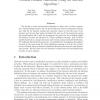Free Online Productivity Tools
i2Speak
i2Symbol
i2OCR
iTex2Img
iWeb2Print
iWeb2Shot
i2Type
iPdf2Split
iPdf2Merge
i2Bopomofo
i2Arabic
i2Style
i2Image
i2PDF
iLatex2Rtf
Sci2ools
JSAC
2006
2006
Wireless channel allocation using an auction algorithm
We develop a novel auction-based algorithm to allow users to fairly compete for a wireless fading channel. We use the second-price auction mechanism whereby user bids for the channel, during each time-slot, based on the fade state of the channel, and the user that makes the higher bid wins use of the channel by paying the second highest bid. Under the assumption that each user has a limited budget for bidding, we show the existence of a Nash equilibrium strategy. And the Nash equilibrium leads to a unique allocation under certain common channel distribution. For uniformly distributed channel state, we establish that the aggregate throughput received by the users using the Nash equilibrium strategy is at least 3/4 of what can be obtained using an optimal centralized allocation that does not take fairness into account. We also show that the allocation resulted from the Nash equilibrium strategy is pareto optimal.
Related Content
| Added | 13 Dec 2010 |
| Updated | 13 Dec 2010 |
| Type | Journal |
| Year | 2006 |
| Where | JSAC |
| Authors | Jun Sun 0007, Eytan Modiano, Lizhong Zheng |
Comments (0)

